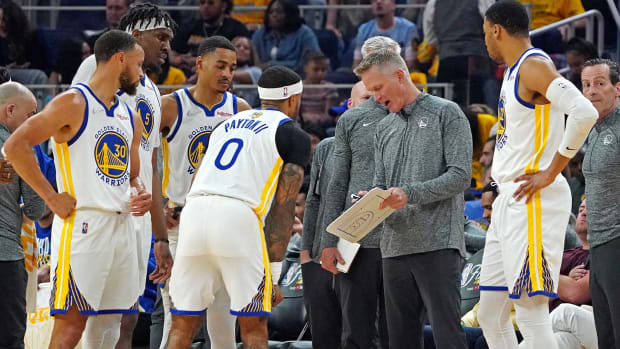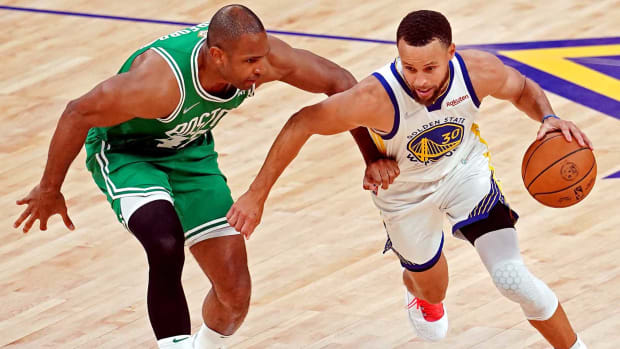If the Warriors were playing the Celtics during the regular season, they probably wouldn’t prepare for more than an hour. The team would hold a shootaround in the morning, have a walkthrough, go over a couple of Boston’s pet plays and maybe take a look at some personnel videos before the game. Then they would go home or fly to the next city and repeat the process 81 times.
In the playoffs? The difference, according to Warriors coach Steve Kerr, is “dramatic.”
“It’s hours and hours and hours of preparation,” Kerr says. “You’re looking for every little edge you can get. You go through every scenario as a staff. All you do is prepare for that one team.
“It’s almost a different sport.”

Kyle Terada/USA TODAY Sports
By this point in the NBA calendar, the basketball taking place is on a different plane than in the regular season. Strategies that worked months ago are thrown out the window. Losses go from “We’ll get the next one!” to soul crushing, or even worse, career defining. And the intensity on a possession-to-possession basis weeds out players who can’t contribute on both ends of the floor. For teams to succeed on this level, and ultimately win a championship, what’s required in June is exponentially more difficult than what’s required in January.
“It’s a completely different game,” says Max Strus, a conference finalist for the Heat. “The intensity and focus that is required is 10x at this level. These are the moments you want to be in.”
“It means more,” says JaVale McGee, whose first-place Suns fell to the Mavericks in Round 2. “It’s a lot of tension, it’s a lot of excitement on what’s at hand, and what the future can hold.”
“Everything we do is a lot more detailed,” says Dallas center Maxi Kleber, a key cog in the team’s three-point heavy offense. “We have a lot more information. Everything is so detailed we know exactly how we want to attack.”
“The game is played differently, everybody is on edge,” says Kerr. “There is a level of awareness, energy and physicality that ramps everything up.“
Watch the NBA Finals online with fuboTV: Try for free!
The difference in playoff basketball really starts in the film room. The Warriors, for example, may break down roughly 25 clips in a regular season film session, according to third-year forward Juan Toscano-Anderson. In the playoffs, that number can approach 70. No screen angle is overlooked, no adjustment too small. Coaches are not only trying to counter how they’ve been attacked, they are trying to anticipate how the other team may adjust as well. And the schematics can vary both within games and between them.
Consider what we’ve seen between the Warriors and Celtics. In Game 1 of the Finals, Boston coach Ime Udoka responded to Golden State’s offensive success by switching more in the fourth quarter, including pre-switching off the ball. In Game 2, the Warriors responded to their struggles defending the three-point line by switching Klay Thompson onto Al Horford, allowing Draymond Green to guard Jaylen Brown. Golden State was then in better position to contain dribble penetration, which prevented some of Boston’s kickout threes. In Game 3, Udoka tweaked his rotation and went to his small lineup earlier in each half. His starting lineup played 14 minutes together in Game 1 compared to only 10 minutes in Game 3. And those are only some of the obvious changes.
Who can stay on the floor in the regular season vs. the playoffs is another stark difference between the styles of play. Strus, for example, played 23.3 minutes per game during the regular season. His minutes increased to 29.1 in the postseason, where he started every game for Miami after being a bench player most of the year. Meanwhile, Duncan Robinson went from starter to largely out of the rotation. That’s because Strus could more reasonably hold up on both ends of the floor.
In the regular season, Strus guarded isolations on 14.8% of his defensive possessions, per Synergy Sports. In the playoffs, that number jumped to 20.6%. That increase was the result of Strus being hunted relentlessly by the likes of Trae Young, James Harden and Jaylen Brown in a way he, or any other lesser defender, wouldn’t have been before the postseason.

Cary Edmondson/USA TODAY Sports
Exploiting weaknesses until the other team comes up with an answer is perhaps the hallmark of playoff basketball. Stephen Curry is a prime example of the type of player who puts immense pressure on defenses. In Game 3, Curry took 11 three-point attempts. Nine of them were the direct result of attacking Celtics bigs off screens, including eight times he targeted Al Horford in drop coverage. In the regular season, Curry ran pick-and-rolls 1.9 possessions per game. In the playoffs, he’s running 8.4 a night, over one-third of his overall possessions. And considering the attention he commands—and the Warriors’ lack of secondary options—that number will almost certainly increase as the Finals go on.
“Every possession matters,” Toscano-Anderson says. “Every possession is do or die. Attention to detail has become such a theme. You don’t want to put yourself in a hole. Every game has a significant meaning, and that’s the difference between the playoffs and the regular season.”
That last point is not lost on the NBA, which in recent years has floated the idea of an in-season tournament to add another trophy into the mix. That idea is multi-layered and the result of many factors—players resting, revenue, television ratings, trying to find the optimal number of games to play in a season—but they all come back down to one issue: Trying to create basketball that’s as meaningful to players and fans as the postseason already is.
And that’s what makes the playoffs so exciting. All the hours of film, the schematic fine tuning, the intensity, the physicality, the emotion, all are the product of the desperation to win a championship. And that urgency generally cannot be replicated artificially.
For either the Warriors or Celtics to ultimately win the Finals, the habits they’ve built during the regular season will certainly be important. The defensive trust, the communication, the improvement from Game 1 to Game 82 will all be factors in their success. But whoever wins will depend on who is best prepared to meet the challenge of playing a style of basketball far more difficult than the one that led to this moment.







